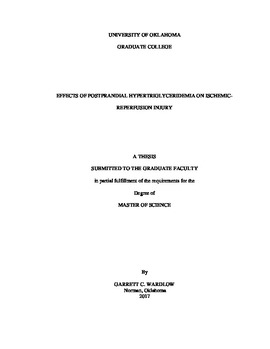| dc.contributor.advisor | Black, Christopher | |
| dc.contributor.author | Wardlow, Garrett | |
| dc.date.accessioned | 2017-05-11T20:17:10Z | |
| dc.date.available | 2017-05-11T20:17:10Z | |
| dc.date.issued | 2017-05-12 | |
| dc.identifier.uri | https://hdl.handle.net/11244/50797 | |
| dc.description.abstract | Background: Cardiovascular disease, including ischemic-reperfusion injury, is the number one cause of mortality in the United States. Among numerous contributing factors, a westernized high fat diet can negatively affect cardiovascular health or compound existing cardiovascular disease. To date, studies have focused on the effects of ischemic-reperfusion injury and high fat meal(s) on the endothelium separately, but have not investigated the impact they have together. Primary Aim: The primary aim of this study was to assess the impact of a single high fat meal followed by an ischemic-reperfusion injury on endothelial-dependent vasodilation. Methods: Subjects consumed either a single high fat meal or placebo, at least seven days apart. The high fat meal was appropriated to each individual and contained 1.5 grams of fat per kg of body weight. Endothelial function was assessed with a flow-mediated dilation technique via ultrasound measurements of the right brachial artery in both the placebo and high fat meal conditions before and after ischemic reperfusion injury. The ischemic-reperfusion period consisted of 20-minutes of occlusion distal to the ultrasound measurement followed by 20-minutes of reperfusion. Occlusion was achieved in both the ischemic-reperfusion period and flow-mediated dilation periods with use of rapid blood pressure cuff inflation. Results: The high-fat meal by itself significantly impaired the flow-mediated dilation of the brachial artery. After the ischemic-reperfusion injury there was still significant impairment in the dilation of the endothelium. These results suggest that the high fat meal has a lasting effect in impairment of the endothelium that prolongs the endothelial health following a negative cardiovascular event such as ischemic-reperfusion injury. This can help to explain how a normal population is directly affected by the consumption of even one high fat meal, and how the effect can carry a lasting impact on their endothelial health. | en_US |
| dc.language | en_US | en_US |
| dc.subject | Exercise Science, Cardiovascular, Hypertriglyceridemia | en_US |
| dc.title | Effects of Postprandial Hypertriglyceridemia on Ischemic-Reperfusion Injury | en_US |
| dc.contributor.committeeMember | Campbell, Jason | |
| dc.contributor.committeeMember | Larson, Rebecca | |
| dc.date.manuscript | 2017-05-11 | |
| dc.thesis.degree | Master of Science | en_US |
| ou.group | College of Arts and Sciences::Department of Health and Exercise Science | en_US |
| shareok.nativefileaccess | restricted | en_US |
